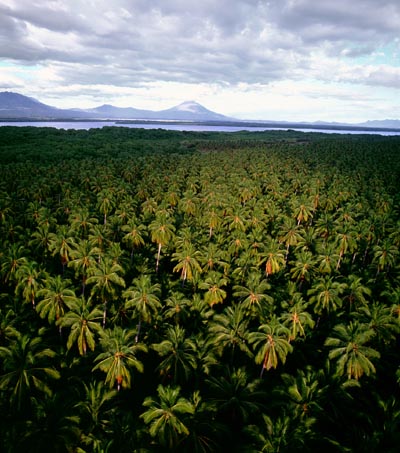Saut au contenu Web-based questionnaire helps small producers in developing countries
“Sustainability Quick Check for Biofuels”
1 déc. 2009 | CELINE ELBER
In the context of eco-friendly mobility, biofuels are often considered as possible alternatives to fossil fuels. However, not all biofuels are really sustainable, as a study carried out by Empa showed two years ago. Small producers of biofuels can only enter the global market of sustainable biofuels if the tools to assess the environmental impact of their biofuels are affordable. The “Sustainability Quick Check for Biofuels” – initiated by the Swiss State Secretary for Economic Affairs SECO and developed by Empa – is worldwide the first web tool for this kind of assessment and freely accessible.

| |
| Caption: For instance oil palms: The “Sustainability Quick Check for Biofuels” (SQCB) enables producers from developing countries to check the compatibility of their biofuels production with sustainability certification criteria. (Photo: iStock) |
| |
| Biofuels are often considered as favorable alternatives to fossil fuels which would help achieving the target of a CO2-neutral and eco-friendly mobility. However, not all biofuels are sustainable, as a study carried out by Empa showed already two years ago. The assessment of environmental impacts along the life cycle of biofuels is a complex and resource-demanding task that small producers in developing countries cannot afford. Therefore, certification schemes bear the risk that such small and independent producers will be locked out and that only international investors and large-scale plantations will dominate the market for sustainable biofuels. |
| |
| Environmental impacts of various production chains of biofuels and feedstocks are already well-studied. This knowledge has now been used to create a web-based questionnaire for a “Sustainability Quick Check for Biofuels” (SQCB). Users only have to enter the most relevant and best-known parameters of the biofuel production chain. Based on this input, a specific inventory is automatically modeled and linked to background data. The SQCB then calculates the greenhouse gas balance and a total environmental impact assessment and checks the results against sustainability criteria. Major goal of the SQCB is to support the market entrance for small biofuel producers, given that strengthening local stakeholders is a key driver for empowering rural communities in developing countries. |
| |
|
| |
| | | The environmental impacts of biofuels can be assessed in only six steps. |
| |
|
| |
| Empa – in collaboration with Prof. Volker Wohlgemuth, HTW Berlin, university of applied sciences (technical implementation) and Agroscope Reckenholz-Tänikon Research Station ART (nutrient modeling) – developed and implemented the SQCB which had been initiated and founded by the Division for Economic Cooperation and Development of the Swiss State Secretariat for Economic Affairs SECO. The tool is freely accessible on the web and is worldwide the first web tool for assessing the environmental impacts of biofuels along the whole value chain. It is currently focused on the Swiss criteria of the ordinance on mineral oil tax. Other sustainability standards like sustainability criteria of the international initiative “Roundtable on Sustainable Biofuels” will be implemented soon. |
| |
| Sustainability Quick Check for Biofuels on the Internet: www.sqcb.org |
| |
| |
| |
| |
Further Information - Dr. Mireille Faist
Empa, Technology and Society
Phone +41 44 823 48 66
- Hans-Peter Egler
Swiss State Secretary for Economic Affairs SECO
Phone +41 31 324 08 13
Media contact - Beatrice Huber
Empa, Communications
Phone +41 44 823 43 77
| | | |
| |


